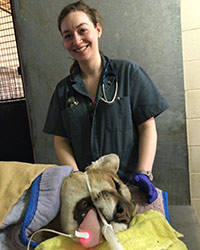What is a Veterinary Anesthesiologist?
A veterinary anesthesiologist is a Doctor of Veterinary Medicine (DVM) who has undergone additional specialized training in anesthesia and pain management in a variety of veterinary species and has successfully passed the certifying examination by the American College of Veterinary Anesthesia and Analgesia (ACVAA).
This additional training includes a minimum of a one-year rotating small animal internship, followed by a minimum of a 3-year residency program in an ACVAA-approved credentialed residency program. The ACVAA certifying examination must be passed to designate a veterinarian as a board-certified veterinary anesthesiologist and pain specialist.
Continuing professional education and promotion of veterinary anesthesia and analgesia through teaching, training and/or peer-reviewed publication are requirements to maintain certification.
What are the benefits of a Veterinary Anesthesiologist?
ACVAA board-certified specialists in veterinary anesthesia and analgesia are experts at assessment and mitigation of anesthetic risks, delivery of anesthetic and pain-relieving drugs, and maintaining and monitoring the physiologic well-being of the patient before, during and after anesthesia. Board-certified anesthesiologists are also pain specialists for both acute and chronic pain and work collaboratively with other hospital departments to optimize patient wellbeing.
If your pet requires an anesthetized procedure, our anesthesia team led by Dr. Legg-St. Pierre will assess your pet with a thorough physical examination, review your pet’s medical history, diagnostic test results and medications, and develop an individualized anesthetic protocol anticipating and mitigating the potential complications and risks specific to your pet’s illness(es) and/or injury(ies). A post-procedural plan for pain management is also created, and your pet’s comfort is regularly reassessed and optimized using validated pain scoring methods during their hospital stay.
Advanced Anesthetic Care:
High quality anesthesia monitoring and supportive care:
- “Hands on” monitoring with a dedicated anesthetist (registered veterinary technologist) for each patient assessing their anesthetic depth, listening to their heart and lungs, palpating pulse quality and observing mucous membrane colour and capillary refill time
- Vital monitoring equipment (ECG, capnography, pulse oximetry, non-invasive blood pressure monitoring, esophageal temperature, Doppler audible pulse)
- Mechanical ventilation (pressure-controlled, volume controlled and spontaneous pressure support) with optional PEEP (positive end-expiratory pressure)
- Arterial catheterization and invasive blood pressure monitoring
- Patient evaluation for sedation vs general anesthesia
- Blood gas analysis (venous and arterial)
- Total intravenous anesthesia and partial intravenous anesthesia
- Administering drugs to support the cardiovascular system (blood pressure, heart rate and cardiac contractility) and the respiratory system (e.g. ventilation strategies and bronchodilators)
- Employing balanced anesthesia techniques to reduce inhalant anesthetic requirements, improve patient stability under anesthesia and ensure adequate pain relief
- IV fluid therapy (crystalloids, blood products, albumin infusion, hypertonic saline)
Peripheral nerve blocks using advanced ultrasound-guidance or nerve-stimulating techniques:
- Femoral/sciatic nerve block
- Brachial Plexus nerve blocks
- Advanced maxillofacial blocks (mandibular, mental, infraorbital, maxillary, palatine, auricular)
- Retrobulbar nerve blocks
- RUMM (radius, ulna, median and musculocutaneous) nerve blocks (ultrasound guided)
- ESP (erector spinae plane) nerve blocks
- TAP (transversus abdominus plane) nerve blocks
- Distal limb/paw nerve blocks (forelimb and hind limb)
- Epidurals (lumbosacral and sacrococcygeal)
Multi-modal pain management:
- Regional anesthesia techniques (nerve blocks)
- Continuous rate infusions
- Injectable analgesia (intravenous, intramuscular, subcutaneous)
- Oral pain medications
- Alternative therapies (recommendations for acupuncture or rehabilitation therapies)
- Holistic approach to patient comfort (environmental and noise management, padded beds, warm blankets and clean towels, cold therapy to reduce inflammation, and medications to reduce stress and anxiety while in hospital)
Our ACVAA Board Certified Anesthesiologist

Dr. Crystalyn Legg-St. Pierre DVM, MSc, DACVAA
Board Certified Veterinary AnesthesiologistDr. Crystalyn Legg-St. Pierre earned her Doctor of Veterinary Medicine at the Western College of Veterinary Medicine in Saskatoon in 2017, where she graduated with distinction.
Her veterinary training continued with completion of a rotating small animal internship in Calgary in 2018, before returning to the Western College of Veterinary Medicine and completing her residency in veterinary anesthesia and analgesia in 2021. Dr. Legg-St. Pierre earned her Master of Science degree during her residency, where her research examined the value of preoxygenation in birds.
Dr. Legg-St. Pierre obtained board-certification as a veterinary anesthesiologist and pain specialist in 2022 and is a Diplomate of the American College of Veterinary Anesthesia and Analgesia. She enjoys working with a variety of species and managing critical and complex anesthetic cases. She is passionate about prioritizing patient care, providing safe anesthesia and optimal pain management for her patients.
